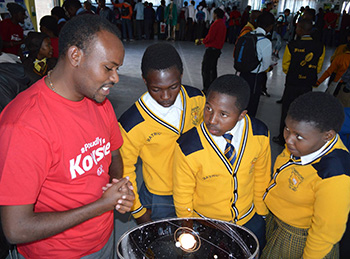Latest News Archive
Please select Category, Year, and then Month to display items
05 June 2018
Photo Supplied
 Archaeological excavations in the Wonderwerk Cave, north of Kuruman in the Northern Cape.
Archaeological excavations in the Wonderwerk Cave, north of Kuruman in the Northern Cape.
Research fellow Dr Lloyd Rossouw from the Department of Plant Sciences at the University of the Free State (UFS) recently published an article in the Nature Ecology and Evolution journal with Dr Michaela Ecker from the University of Toronto as lead author, and Dr James Brink, research fellow at the UFS Centre for Environmental Management. The findings described in “The palaeoecological context of the Oldowan-Acheulean in southern Africa” provides the first extensive paleoenvironmental sequence for the interior of southern Africa by applying a combination of methods for environmental reconstruction at Wonderwerk Cave, which have yielded multiple evidence of early human occupation dating back almost two million years ago.
Where water once was
The Wonderwerk Cave is found north of the Kuruman hills (situated in Northern Cape) a 140m long tube with a low ceiling. The surroundings are harsh. Semi-arid conditions allow for the survival of only hardy bushes, trees, and grasses. But during the Early Pleistocene, stepping out of the Wonderwerk Cave you would have been greeted by a completely different site, the researchers found. Using carbon and oxygen stable isotope analysis on the teeth of herbivores (Dr Ecker), fossil faunal abundance (Dr Brink), as well as the analysis of microscopic plant silica remains (phytoliths) excavated from fossil soils inside the cave (Dr Rossouw), the results show that ancient environments in the central interior of southern Africa were significantly wetter and housed a plant community unlike any other in the modern African savanna.
What difference does it make?
While East African research shows increasing aridity and the spread of summer-rainfall grasslands more than a million years ago, the results from this study indicate an interesting twist. During the same period, shifts in rainfall seasonality allowed for alternating summer and winter-rainfall grass occurrences coupled with prolonged wetlands, that remained major components of Early Pleistocene (more or less the period between one and two million years ago) environments in the central interior of southern Africa. That means our human ancestors were also living and evolving in environments other than the generally accepted open, arid grassland model.
Prospective Kovsies advised to respect themselves
2015-05-22

|
Thousands of prospective Kovsies had a brief but unforgettable experience of being a Kovsie when they descended on the Qwaqwa Campus for the Open Day on 16 May 2015.
They came from all over the Thabo Mofutsanyana District, and from as far as Ladysmith in KwaZulu-Natal.
“You are special,” was the message from Dr Choice Makhetha, Vice-Rector: External Relations.
“Each one of you is very special, and don’t allow anyone to tell you otherwise,” said Dr Makhetha.
“Each one has a brilliant mind and you can achieve anything you set your mind to. This can only happen if your thoughts and whatever you say to yourself are positive all time.”
The learners were also reminded to take themselves seriously, and to always respect themselves.
“It is important that you must have respect for yourself, for others, and for the environment. When you respect yourself, you respect time. You must make it your business to know and read extensively,” she said.
After the formal programme, learners were exposed to different study programmes and student services by visiting various faculties and departments.
The programme included messages of support from the Campus Management and the SRC. Entertainment was provided by a South African hip-hop group, Skwatta Kamp, a student ensemble called Unspoken, and a breathtaking laser show.